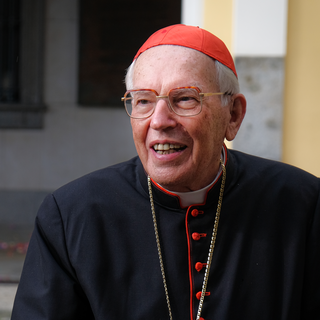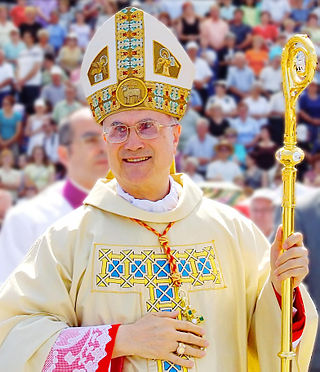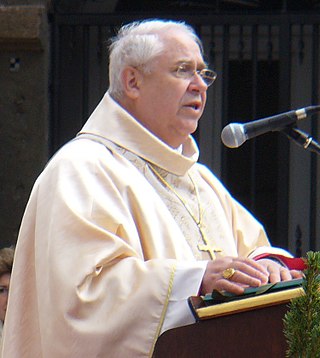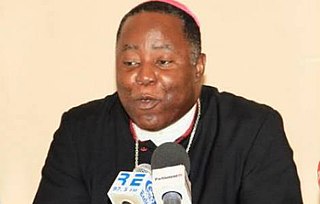
Theodore Edgar McCarrick is a laicized American Catholic bishop, former cardinal, and former priest who served as Archbishop of Newark from 1986 to 2000 and as Archbishop of Washington from 2001 to 2006. In 2019, McCarrick was defrocked after having been convicted of sexual misconduct in a canonical trial.

Giovanni Battista Re is an Italian cardinal of the Catholic Church whose service has been primarily in the Roman Curia. He was elevated to the rank of cardinal in 2001. He was prefect of the Congregation for Bishops from 2000 to 2010. As the senior cardinal-bishop in attendance, he chaired the March 2013 papal conclave to elect Pope Benedict XVI's successor. Pope Francis approved his election as Dean of the College of Cardinals on 18 January 2020.

Pope Francis is the head of the Catholic Church and sovereign of the Vatican City State. He is the first pope to be a member of the Society of Jesus, the first from the Americas and the Southern Hemisphere, and the first born or raised outside Europe since the 8th-century papacy of the Syrian pope Gregory III.

Tarcisio Pietro Evasio Bertone is an Italian prelate of the Catholic Church and a Vatican diplomat. A cardinal since 2003, he served as Archbishop of Vercelli from 1991 to 1995, as Secretary of the Congregation for the Doctrine of the Faith, Archbishop of Genoa from 2002 to 2006, and as Cardinal Secretary of State from 2006 to 2013. On 10 May 2008, he was named Cardinal-Bishop of Frascati.

Agostino Cacciavillan was an Italian prelate of the Catholic Church, and a cardinal since 2001. He worked in the diplomatic service of the Holy See from 1959 to 1998; he was given the titles of archbishop and nuncio in 1998 and served as Pro-Nuncio to Kenya, India, Nepal, and the United States between 1976 and 1998. He then worked in the Roman Curia from 1998 to 2002 as President of the Administration of the Patrimony of the Apostolic See.
The Secretariat of State is the oldest dicastery in the Roman Curia, the central papal governing bureaucracy of the Catholic Church. It is headed by the Cardinal Secretary of State and performs all the political and diplomatic functions of the Holy See. The Secretariat is divided into three sections: the Section for General Affairs, the Section for Relations with States, and, since 2017, the Section for Diplomatic Staff.

Leonardo Sandri is an Argentine prelate of the Catholic Church who has been a cardinal since November 2007 and vice dean of the College of Cardinals since January 2020. He was prefect of the Congregation for the Eastern Churches from 2007 to 2022. He served in the diplomatic service of the Holy See from 1974 to 1991 in several overseas assignments, including as a permanent observer of the Holy See before the Organization of American States from 1989 to 1991, and in Rome as Substitute for General Affairs in the Secretariat of State from 1999 to 2007.

James Michael Harvey is an American prelate of the Catholic Church. Trained as a diplomat, he served from 1982 to 1998 in the central administration of the Holy See's Secretariat of State. From 1998 to 2012 Harvey managed the pope's household, first for Pope John Paul II and then for Pope Benedict XVI. He was named a bishop in 1998, an archbishop in 2003, and a cardinal in 2012.
The Administration of the Patrimony of the Apostolic See is the office of the Roman Curia that deals with the "provisions owned by the Holy See in order to provide the funds necessary for the Roman Curia to function". It was established by Pope Paul VI on 15 August 1967 and reorganized on 8 July 2014. APSA acts as the treasury and central bank of Vatican City and the Holy See.

Kevin Joseph Farrell KGCHS is an Irish-born prelate of the Catholic Church who has been a cardinal and has served as prefect of the Dicastery for the Laity, Family and Life, as Camerlengo of the Holy Roman Church and as President of the Supreme Court of Vatican City.

Fernando Filoni is an Italian cardinal of the Catholic Church who serves as Grand Master of the Equestrian Order of the Holy Sepulchre. He was Prefect of the Congregation for the Evangelization of Peoples from 2011 to 2019. He is an expert in Chinese affairs and on the Middle East.

Carlo Maria Viganò is an Italian traditionalist Catholic archbishop who served as Apostolic Nuncio to the United States from 2011 to 2016 and as secretary-general of the Governorate of Vatican City State from 2009 to 2011. He is known for having publicized the Vatican leaks scandal of 2012, in which he revealed financial corruption in the Vatican, and a 2018 letter accusing Pope Francis and other Catholic leaders of covering up sexual abuse allegations against former cardinal Theodore McCarrick. In 2024, Viganò was charged by the Vatican with schism. He was declared guilty and excommunicated.
The law of Vatican City State consists of many forms, the most important of which is the canon law of the Catholic Church. The organs of state are governed by the Fundamental Law of Vatican City State. The Code of Penal Procedure governs tribunals and the Lateran Treaty governs relations with the Italian Republic.

Domenico Calcagno is an Italian prelate of the Catholic Church. He has been a bishop since 2002 and a cardinal since 2012. From 7 July 2011 to 26 June 2018 he was President of the Administration of the Patrimony of the Holy See, where he had served as secretary since 2007.

Alfred Xuereb is a Maltese prelate of the Catholic Church who works in the diplomatic service of the Holy See. He previously worked in the Roman Curia and was a private secretary to Pope Benedict XVI from 2007 to 2013 and to Pope Francis from 2013 to 2014.

The Dictator Pope: The Inside Story of the Francis Papacy is an unauthorized biography of Pope Francis authored by the Anglo–French historian H. J. A. Sire under the pseudonym "Marcantonio Colonna". Published initially in Italian, and later in English, the book takes a highly critical view of Pope Francis and his papacy over the Catholic Church. The book contends to be "the inside story of the most tyrannical and unprincipled papacy of modern times," arguing that Pope Francis, while presenting himself as humble, rules over the Church through fear and has allied to some of the most corrupt elements in the Vatican. On its 2017 release, the book reached 4th place on Amazon Kindle's Religion and Spirituality bestseller list.

Filomeno do Nascimento Vieira Dias is an Angolan prelate of the Catholic Church who has been Archbishop of Luanda since 2015; he was an auxiliary bishop there from 2003 to 2005. He was Bishop of Cabinda from 2005 to 2014, where his lack of identification with the province and its separatist movement initially made his appointment controversial and he was only installed after sixteen months.
Mauro Rivella is an Italian Roman Catholic cleric who served as the secretary of the Administration of the Patrimony of the Apostolic See (APSA) from 2015 to 2020 and since 2022 has been the episcopal vicar for economic affairs in the Archdiocese of Turin.
Libero Milone is a Netherlands-born Italian businessman who has held high-ranking positions at Deloitte and who was appointed by Pope Francis to be the first auditor-general of the Vatican in 2015 before being forced to resign in 2017.
Events in the year 2022 in Vatican City.

















